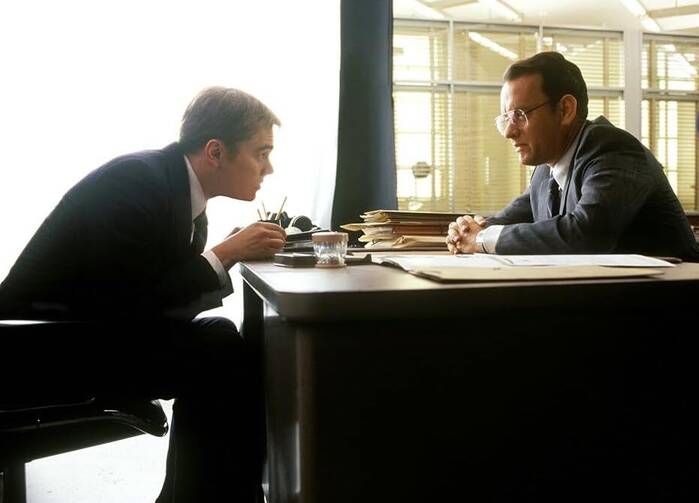The Catholic Movie Club is a short weekly essay pulling out spiritual themes in our favorite films. You can discuss the movies with other readers in the comments on this page or in our Facebook group. Find past Catholic Movie Club selections here.
For the month of December, Catholic Movie Club will cover more recent – and less well-known – Christmas films, to give you some new additions to your holiday canon.
The Christmas season has a unique loneliness. It’s the time of year when we may feel the loss or estrangement of loved ones most sharply, as carols,movies and commercials remind us that this is a time to be home with family. And if you’ve always found the concept of “home” elusive, the holidays can make you aware of a deeper, spiritual loneliness: the sense of being adrift, unsure if there’s anywhere that you belong.
This week’s film is about someone who longs for a home that may not even exist: Stephen Spielberg’s “Catch Me If You Can” (2002), written by Jeff Nathanson. It’s also, in my opinion, an underappreciated Christmas movie. I realize that designation might be controversial. But if the annual discourse around “Die Hard” has taught us anything, it’s that “Christmas movie” is a broad category. “Catch Me If You Can” returns to Christmas again and again, like a scab it can’t stop scratching. It’s the day when Frank (Leonardo DiCaprio) is reminded, most starkly, of his loneliness and desire for home; it’s also the day when he, improbably, makes the most honest connections with another person.
“Catch Me If You Can” returns to Christmas again and again, like a scab it can’t stop scratching.
Based on the semi-true story of Frank Abagnale Jr., the film follows Frank as he runs away from a broken home, begins forging checks, and successfully impersonates an airline pilot, a doctor, and a state’s attorney, all before his 19th birthday. As he crosses the country (and, eventually, oceans), he’s pursued by Carl Hanratty (Tom Hanks), an abrasive FBI agent.
“The chase” both defines the film’s action and its central theme. All of the characters are chasing something transcendent, something that they believe will complete them. For Frank, it’s a perfect family and home; he believed he had them once before his father’s financial indiscretions and his parents’ divorce shattered that illusion. For Hanratty, it’s Frank—or, more accurately, the big arrest that will finally win him the respect of his colleagues and justify how much of his personal life he’s sacrificed for the job. But the things they're chasing are always just beyond their reach, and maybe only exist in fantasy.
Through their frailty and incompleteness, Frank and Hanratty form an improbable bond. Christmas always brings Frank’s spiritual homelessness into sharp focus. He begins calling Hanratty at the FBI offices every Christmas Eve; Hanratty—who is long-estranged from his family and volunteers to work on the holidays every year—always answers. “You have no one else to call,” Hanratty realizes during their first conversation. Stung, Frank hangs up… but the next year, he calls again. Frank is lying to everyone else in his life, even his eventual fiancee, Brenda (Amy Adams), whom he meets during a con. The only person he can be honest with is the man hunting him.
Maybe unconsciously, Frank and Hanratty recognize each other as fellow lonely souls. Hanratty accurately surmises that while Frank doesn’t necessarily want to be caught, he does want to be chased. He wants someone to care enough to pursue him and give him a reason to stop running. They discover a measure of peace and forgiveness in each other’s brokenness that they can’t in their own families.
There’s something of Augustine in their restlessness: the God-shaped hole in every human being that keeps us from being satisfied, a divine itch. This is why I consider “Catch Me If You Can” a Christmas movie, not just a movie that happens to involve Christmas. Even if we don’t think of Christmas as a lonely time, it does remind us of our unfulfilled desire for God, the holy longing that keeps us striving and searching even as its source remains, in this life, just out of reach. Advent invites us to immerse ourselves in waiting, in dreaming of a home we’ve never seen and a peace that eludes us.
That waiting can be unbearable. Like Frank we may find ourselves tempted to run away and lose ourselves in fantasies of glamor and wealth and excitement, hoping that will quiet the ache of yearning. Or we can reach out to other lonely souls, and in each other’s brokenness find an imperfect grace.
“Catch Me If You Can” is streaming on Netflix, Paramount+, and DirecTV.








